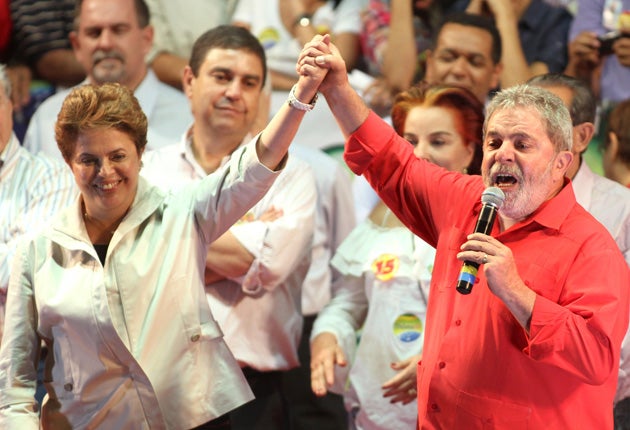Front-runner in Brazilian election denies corruption

With just three weeks before Brazilians go to the polls to decide who should fill the shoes of President Luiz Inacio Lula de Silva, the campaign has abruptly been muddied by allegations of dirty-tricks campaigning and corruption on the part of the ruling party's candidate, Dilma Rousseff.
"Their democracy is one that uses the state apparatus to protect their comrades and persecute their adversaries," Jose Serra, the candidate for the opposition Brazilian Social Democratic Party (PSDB), railed in a television debate on Sunday, citing reports of illegal kickbacks in the government.
In the past, Mr Serra has also accused President Lula's ruling Workers' Party of accessing the tax records of PSDB members to help forge political attacks against them.
A former governor of Sao Paolo state, Mr Serra is straining to slow Ms Rousseff's momentum at least to deprive her of the 50 per cent of votes she will need on 3 October to avoid a second run-off ballot four weeks later. It's an uphill task, however. A new poll published at the weekend showed her with precisely 50 per cent support against just 27 per cent for Mr Serra.
Ms Rousseff, a 62-year-old career civil servant with little obvious charisma, may be almost impregnable because of the enduring popularity of President Lula, who is widely credited with helping to give Brazil a new swagger on the world stage with zooming rates of economic growth. His policies have also helped lift swathes of its population out of poverty.
Gaps still remain. Brazil still has a woeful record on education, is weighed down by a government bureaucracy that Steve Jobs recently cited as the reason why he would not be putting an Apple shop in Rio de Janeiro, and must deal with a potholed transport infrastructure screaming for investment.
But nearing the end of his second term with an approval rating of around 70 per cent, Lula has taken a starring role in Ms Rousseff's campaign, giving her an almost insurmountable advantage.
Yet she found herself on the defence in the TV debate after a leading Brazilian news magazine said at the weekend that her former top aide, and now cabinet chief to President Lula, has been involved in kickbacks allegedly paid to a consulting firm run by her son by companies seeking government contracts. The official, Erenice Guerra, has strongly denied the claims.
Ms Rousseff also attempted to deflect any suggestion that the claims touched her reputation. "This is an electoral move being systematically made against me," she complained during the debate, noting that the allegations only concerned Ms Guerra's son. "I won't accept being judged based on what happened to the son of a former aide. It smells of an electoral manoeuvre."
In a statement, Ms Guerra accused the magazine, Veja, of attempting to interfere in the presidential race in the "least ethical" manner possible and said she intended to file a suit against it for slander.
Brazil's economic growth has been spurred in part by China's appetite for its natural resources and the discovery of large offshore oil reserves. Helping to enhance the national mood since Lula became president in 2003 meanwhile has been Brazil's success in luring both the soccer World Cup in 2012 and the summer Olympic games four years later in Rio de Janeiro.
Subscribe to Independent Premium to bookmark this article
Want to bookmark your favourite articles and stories to read or reference later? Start your Independent Premium subscription today.

Join our commenting forum
Join thought-provoking conversations, follow other Independent readers and see their replies